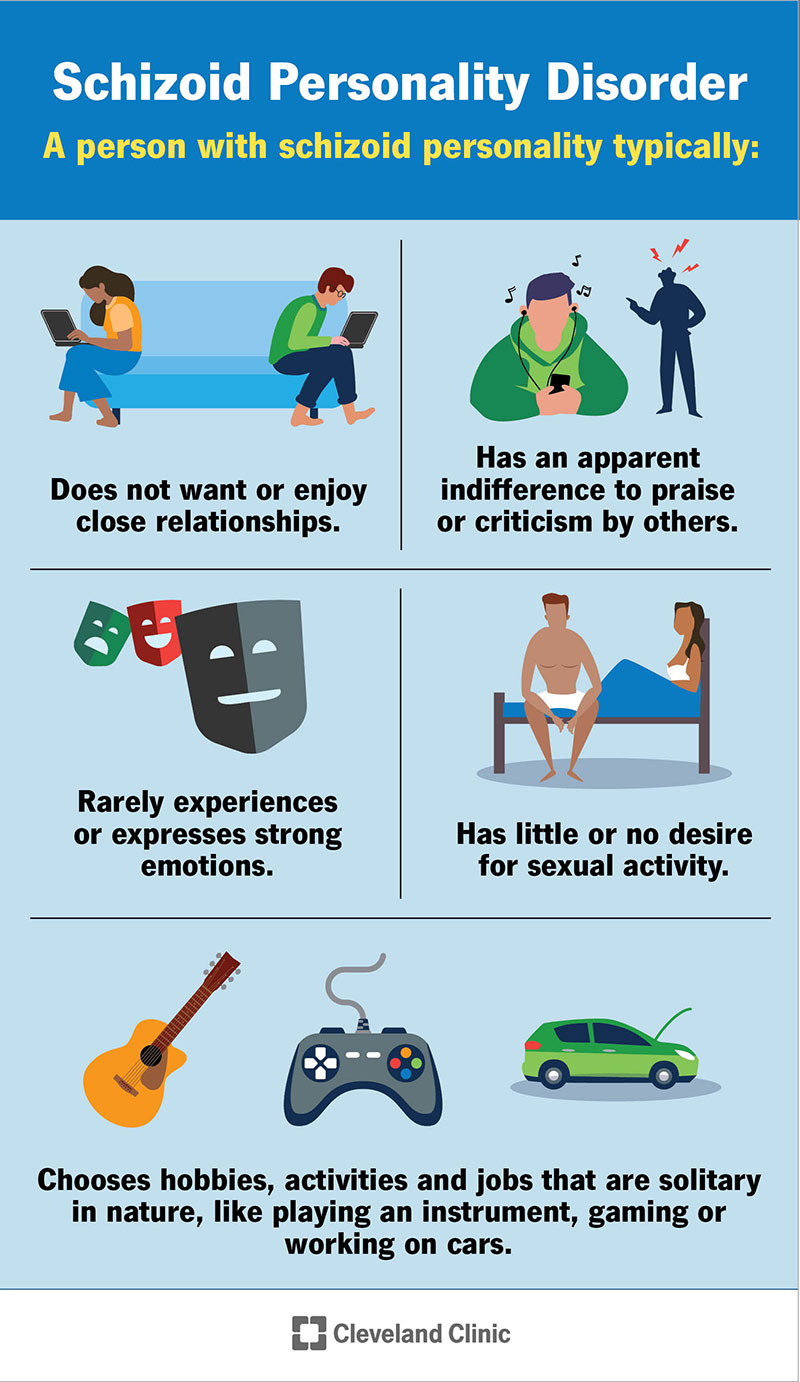People with schizoid personality disorder (ScPD) don’t care to form or maintain relationships. They also don’t have or express strong emotions. They rarely seek treatment because they don’t see an issue with their behavior or way of thinking.
Advertisement
Cleveland Clinic is a non-profit academic medical center. Advertising on our site helps support our mission. We do not endorse non-Cleveland Clinic products or services. Policy
Schizoid personality disorder (ScPD) is a mental health condition that involves a general lack of interest in all types of relationships. People with ScPD also have a limited range of emotions when interacting with others.
Advertisement
Cleveland Clinic is a non-profit academic medical center. Advertising on our site helps support our mission. We do not endorse non-Cleveland Clinic products or services. Policy
People with schizoid personality disorder may seem aloof, disengaged and distant. They rarely seek help for the disorder because they think their behavior is normal.
ScPD is one of a group of conditions called “cluster A” personality disorders. They involve unusual and eccentric thinking or behaviors that affect daily functioning.
Schizoid personality disorder is relatively uncommon. About 1% to 5%of people in the United States have this condition.

Image content: This image is available to view online.
View image online (https://my.clevelandclinic.org/-/scassets/images/org/health/articles/23030-schizoid-personality-disorder)
The main symptom of schizoid personality disorder is detachment from and general disinterest in relationships. This applies to forming and maintaining bonds.
A person with schizoid personality disorder typically:
Most personality disorders begin in the teenage years. But ScPD may start at an earlier age.
Personality disorders are among the least understood mental health conditions. Researchers don’t know the exact cause of them. So far, they think the following factors may contribute to schizoid personality disorder:
Advertisement
Mental health providers diagnose schizoid personality disorder using the criteria for it in DSM-5. If they suspect ScPD, they ask questions that shed light on:
Providers often work with the person’s family and coworkers to get more information. Personality disorders, including ScPD, can be difficult to diagnose. Most people with one of these disorders don’t think there’s a problem with their behavior or way of thinking. They may only get help if a family member urges them to.
There’s no cure for schizoid personality disorder. It’s one of the least researched personality disorders. So, treatment options are limited.
Psychotherapy (talk therapy) is generally the treatment of choice for personality disorders. But this may be difficult for people with ScPD. They’re often not upset by their disinterest in people. So, they may not have a reason to change.
Types of psychotherapy that may benefit people with this disorder include:
People with schizoid personality disorder generally live well-adjusted lives. Compared to people with other types of personality disorders, people with ScPD are less likely to experience anxiety or depression. This is especially the case if they’re not in social, educational or occupational situations that put pressure on their limited social skills.
If you have a family member with ScPD, it may be hard to cope with their emotional distancing. Reach out to a mental health provider if it’s causing you distress.
Schizophrenia is a mental health condition that causes a major break from reality. You may have hallucinations, delusions and extremely disorganized thinking and behavior. These symptoms greatly impair your daily functioning.
Schizoid personality disorder doesn’t cause hallucinations or delusions. The condition usually doesn’t significantly affect your day-to-day functioning.
Advertisement
“Schizoid” comes from Greek roots and means “to split.” Eugen Bleuler, a psychiatrist, used this word to name schizoid personality disorder in the early 1900s because people with it “split from” social interactions and emotional attachment. It’s different from the modern understanding of schizophrenia, which involves a “splitting of the mind” from reality.
It can be hard to understand why your family member doesn’t care about being close. Especially if relationships come so naturally to you. Someone with schizoid personality disorder (ScPD) may not want to change. While you can’t control how they live their life, you can control yours. Consider seeing a therapist if you’re experiencing isolation or grief due to ScPD.
Advertisement

Sign up for our Health Essentials emails for expert guidance on nutrition, fitness, sleep, skin care and more.
Learn more about the Health Library and our editorial process.
Cleveland Clinic’s health articles are based on evidence-backed information and review by medical professionals to ensure accuracy, reliability and up-to-date clinical standards.
Cleveland Clinic’s health articles are based on evidence-backed information and review by medical professionals to ensure accuracy, reliability and up-to-date clinical standards.
Your mental well-being is just as important as your physical well-being. Cleveland Clinic’s mental health experts can help you live life to the fullest.
